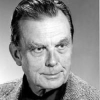Czeslaw Milosz

Czeslaw Milosz
Czesław Miłosz; 30 June 1911 – 14 August 2004) was a Polish poet, prose writer, translator and diplomat. His World War II-era sequence The World is a collection of twenty "naïve" poems. Following the war, he served as Polish cultural attaché in Paris and Washington, D.C., then in 1951 defected to the West. His nonfiction book The Captive Mindbecame a classic of anti-Stalinism. From 1961 to 1998 he was a professor of Slavic Languages and Literatures at the University of...
ProfessionPoet
Date of Birth30 June 1911
CitySeteniai, Lithuania
Do you know how it is when one wakes at night suddenly and asks, listening to the pounding heart: what more do you want, insatiable?
At every sunrise I renounce the doubts of night and greet the new day of a most precious delusion.
I have defined poetry as a 'passionate pursuit of the Real.
It is impossible to communicate to people who have not experienced it the undefinable menace of total rationalism.
The child who dwells inside us trusts that there are wise men somewhere who know the truth.
Vulgarized knowledge characteristically gives birth to a feeling that everything is understandable and explained. It is like a system of bridges built over chasms. One can travel boldly ahead over these bridges, ignoring the chasms. It is forbidden to look down into them; but that, alas, does not alter the fact that they exist.
It was only toward the middle of the twentieth century that the inhabitants of many European countries came, in general unpleasantly, to the realization that their fate could be influenced directly by intricate and abstruse books of philosophy.
A weak human mercy walks in the corridors of hospitals and is like a half-thawed winter.
Under various names, I have praised only you, rivers! You are milk and honey and love and death and dance. From a spring in hidden grottoes, seeping from mossy rocks, Where a goddess pours live water from a pitcher, At clear streams in the meadow, where rills murmur underground, Your race and my race begin, and amazement, and quick passage.
When I die, I will see the lining of the world. The other side, beyond bird, mountain, sunset.
And if there is no lining to the world? If a thrush on a branch is not a sign, But just a thrush on the branch? If night and day Make no sense following each other?
There was a time when only wise books were read helping us to bear our pain and misery. This, after all, is not quite the same as leafing through a thousand works fresh from psychiatric clinics. And yet the world is different from what it seems to be and we are other than how we see ourselves in our ravings.
From life, from the apple cut by the flaming knife, what grain will be saved? My son, believe me, nothing remains, Only adult toil, the furrow of fate in the palm. Only toil, Nothing more.
They used to pour millet on graves or poppy seeds To feed the dead who would come disguised as birds. I put this book here for you, who once lived So that you should visit us no more.